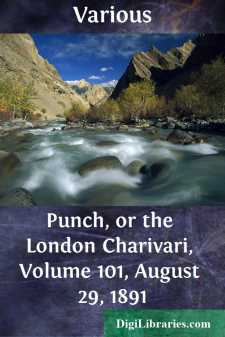Categories
- Antiques & Collectibles 13
- Architecture 36
- Art 48
- Bibles 22
- Biography & Autobiography 813
- Body, Mind & Spirit 142
- Business & Economics 28
- Children's Books 16
- Children's Fiction 13
- Computers 4
- Cooking 94
- Crafts & Hobbies 4
- Drama 346
- Education 46
- Family & Relationships 57
- Fiction 11829
- Games 19
- Gardening 17
- Health & Fitness 34
- History 1377
- House & Home 1
- Humor 147
- Juvenile Fiction 1873
- Juvenile Nonfiction 202
- Language Arts & Disciplines 88
- Law 16
- Literary Collections 686
- Literary Criticism 179
- Mathematics 13
- Medical 41
- Music 40
- Nature 179
- Non-Classifiable 1768
- Performing Arts 7
- Periodicals 1453
- Philosophy 64
- Photography 2
- Poetry 896
- Political Science 203
- Psychology 42
- Reference 154
- Religion 513
- Science 126
- Self-Help 84
- Social Science 81
- Sports & Recreation 34
- Study Aids 3
- Technology & Engineering 59
- Transportation 23
- Travel 463
- True Crime 29
Punch, or the London Charivari, Volume 101, August 29, 1891
by: Various
Categories:
Description:
Excerpt
STORICULES.
I.—THE SUICIDE-ADVERTISEMENT.
As you stood before the automatic machine on the station platform, making an imbecile choice between a packet of gooseberry nougat and a slab of the gum caramel, you could not help seeing on the level of your eye this notice:—"BLACKING-CREAM. ASK FOR HIGLINSON'S, AND TAKE NO OTHER."
Similar announcements met you on every hoarding, in almost every paper and magazine, on every omnibus. Neat little packets of HIGLINSON's Blacking-cream were dropped through your letter-box, with a printed request that you would honour Mr. HIGLINSON by trying it. Leaflets were handed you in the street to tell you what public analysts said about it, and in what great hotels it was the only blacking used. Importunity pays. Sooner or later you bought HIGLINSON's Blacking-cream. You then found out that it was just about as good as any other, and went on buying it.
In one way this was very good for Mr. HIGLINSON, because he became very rich; in other ways it was not so good for him. For a long time he had nothing to do with public life; the public never thought about his existence; to the public he was not a man at all—he was only part of the name of the stuff they used for their boots. If he had introduced himself to a stranger, giving the name of HIGLINSON, it is probable that the stranger would have remarked jocularly, "No relation to the Blacking-cream, I presume?" HIGLINSON knew this, and it pained him deeply, for he was a sensitive man.
Because he was sensitive and felt things so much, he wrote a volume of very melancholy verses. He was unmarried and lonely, and he wanted to lead a high life. He said as much in his verses. But what comes well from Sir GALAHAD comes ill from the proprietor of a Blacking-cream; and—from idiotic notions about pluck and honesty—he had put his own name to his book. Unfortunately, those who feel much are not always those who can express much; and HIGLINSON could not express anything. So critics with a light mind had a very fine time with these verses. They quoted them, with the prefatory remark:—"The cream of the collection—perhaps we might say the Blacking-cream of the collection—is the following," and they wound up their criticism with saying that the book must have been simply published as an advertisement. Mr. HIGLINSON could hardly have been mad enough to have printed such stuff from any other motive.
Of course HIGLINSON should have changed his name, and should have married. But the idiotic notions about pluck prevented him from changing his name; and he would not marry a woman who accepted him from only mercenary motives. He was so unattractive that he did not think it possible a woman would marry him for any other reason. However, he could not always be superintending the manufacture of Blacking-cream; and it was obvious to him that he could publish no more verses. So he devoted himself to philanthropy in a quiet and unostentatious way. He attempted the reclamation of street-arabs. He worked among them....












